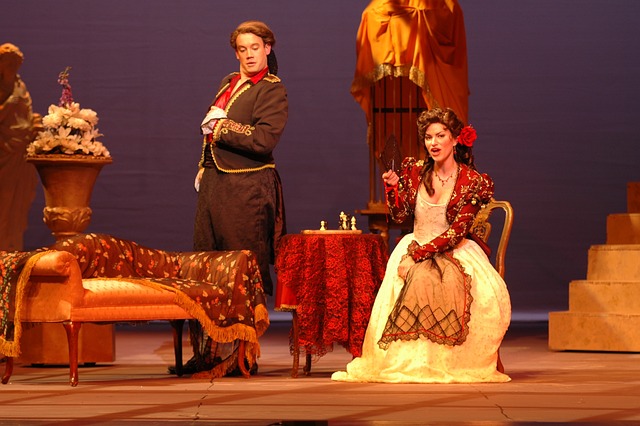What is Opera?
Opera is an art form consisting of a dramatic stage performance set to music.
 The drama is presented using the typical
elements of theater such as scenery, costumes, and
acting. However, the words of the opera, or libretto, are sung rather than spoken. The singers are accompanied
by a musical ensemble ranging from a small instrumental
ensemble to a full symphonic.
The drama is presented using the typical
elements of theater such as scenery, costumes, and
acting. However, the words of the opera, or libretto, are sung rather than spoken. The singers are accompanied
by a musical ensemble ranging from a small instrumental
ensemble to a full symphonic.
Traditional opera consists of two modes of singing: recitative, the dialogue and plot-driving passages often sung in a non-melodic style characteristic of opera, and aria, during which the movement of the plot often stops and the music and the singers focus on one topic using full voice. Short sung passages are also referred to as arioso. Each type of singing is accompanied by musical instruments.
Singers and the roles they play are classified according to their vocal ranges. A particular singer's classifications change drastically over his or her lifetime, rarely reaching vocal maturity until well past middle age. Male singers are classified as bass, bass-baritone, baritone, tenor and countertenor. Female singers are classified, as contralto, mezzo-soprano and soprano. Each of these classifications has subcategories, (German, fach), such as lyric soprano, coloratura, soubrette, spinto, and dramatic soprano, which associate the singer's voice with the roles most suitable to the vocal timbre and quality and its range, or tessitura.
Sociology of Opera
All art forms have a social context, and opera likewise cannot exist in a vacuum. A string quartet exists in manuscript and printed score, and a truly musical person, playing one part, or seated at a keyboard, can hear the intent of the music, but the printed score for an opera must be realized in a production, even a slender one, for its impact. Thus there exists a "sociology of opera" which would be as interesting to general social historians (who are unaware of it, on the whole) as it is to opera buffs.
Operas have always been written with a specific audience in mind, whether more aristocratic or more popular, expressing their local prejudices and expectations, and even taking account of the vocal character of certain singers' voices. Operas have also been affected behind the scenes, by opera house politics and sometimes government censors. But the idea that there is a canon of operas, an opera repertory that is reflected in a "List of famous operas," for example, is a late entry in the sociology of opera.




